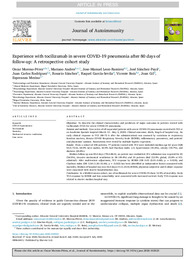Por favor, use este identificador para citar o enlazar este ítem:
https://hdl.handle.net/11000/31051Registro completo de metadatos
| Campo DC | Valor | Lengua/Idioma |
|---|---|---|
| dc.contributor.author | Moreno-Pérez, Oscar | - |
| dc.contributor.author | Andres, Mariano | - |
| dc.contributor.author | LEON-RAMIREZ, JOSE-MANUEL | - |
| dc.contributor.author | Sánchez-Payá, José | - |
| dc.contributor.author | Rodríguez, Juan Carlos | - |
| dc.contributor.author | Sánchez, Rosario | - |
| dc.contributor.author | García Sevila, Raquel | - |
| dc.contributor.author | Boix, Vicente | - |
| dc.contributor.author | Gil, Joan | - |
| dc.contributor.author | Merino, Esperanza | - |
| dc.contributor.other | Departamentos de la UMH::Medicina Clínica | es_ES |
| dc.date.accessioned | 2024-02-05T12:09:09Z | - |
| dc.date.available | 2024-02-05T12:09:09Z | - |
| dc.date.created | 2020 | - |
| dc.identifier.citation | Journal of Autoimmunity . 2020 Nov:114:102523 | es_ES |
| dc.identifier.issn | 1095-9157 | - |
| dc.identifier.uri | https://hdl.handle.net/11000/31051 | - |
| dc.description.abstract | Objectives: To describe the clinical characteristics and predictors of major outcomes in patients treated with tocilizumab (TCZ) for severe COVID-19 pneumonia.Patients and methods: Case series of all sequential patients with severe COVID-19 pneumonia treated with TCZ at an Academic Spanish hospital (March 12 - May 2, 2020). Clinical outcomes: death, length of hospital stay. An early clinical response to TCZ (48-72 h after the administration) was assessed by variations in respiratory function markers, Brescia COVID Respiratory Severity Scale (BCRSS), inflammatory parameters, and patients' and physicians' opinion. Associations were tested by multiple logistic regression.Results: From a cohort of 236 patients, 77 patients treated with TCZ were included (median age 62 years (IQR 53.0-72.0), 64.9% were males), 42.9% had Charlson index ≥3; hypertension (41.6%), obesity (34.7%), and diabetes (20.8%). Median follow-up was 83.0 days (78.0-86.5), no patient was readmitted. ICU admission was required for 42 (54.5%), invasive mechanical ventilation in 38 (49.4%) and 10 patients died (12.9% global, 23.8% at ICU admitted). After multivariate adjustment, TCZ response by BCRSS (OR 0.03 (0.01-0.68), p = 0.028), and Charlson index (OR 3.54 (1.20-10.44), p = 0.022) has been identified as independent factors associated with mortality. Median of hospital stay was 16.0 days (11.0-23.0); BCRSS, physician subjective and D-dimer response were associated with shorter hospitalization stay.Conclusions: In a Mediterranean cohort, use of tocilizumab for severe COVID-19 show 12.9% of mortality. Early TCZ-response by BCRSS and low comorbidity were associated with increased survival. Early TCZ-response was related to shorter median hospital stay. | es_ES |
| dc.format | application/pdf | es_ES |
| dc.format.extent | 8 | es_ES |
| dc.language.iso | eng | es_ES |
| dc.publisher | Elsevier | es_ES |
| dc.rights | info:eu-repo/semantics/openAccess | es_ES |
| dc.rights.uri | http://creativecommons.org/licenses/by-nc-nd/4.0/ | * |
| dc.subject | COVID19 pneumonia | es_ES |
| dc.subject | Tocilizumab | es_ES |
| dc.subject | Mortality | es_ES |
| dc.subject | Mechanical invasive ventilation | es_ES |
| dc.subject | Case series | es_ES |
| dc.subject.other | CDU::6 - Ciencias aplicadas::61 - Medicina::616 - Patología. Medicina clínica. Oncología | es_ES |
| dc.title | Experience with tocilizumab in severe COVID-19 pneumonia after 80 days of follow-up: A retrospective cohort study | es_ES |
| dc.type | info:eu-repo/semantics/article | es_ES |
| dc.relation.publisherversion | https://doi.org/10.1016/j.jaut.2020.102523 | es_ES |

Ver/Abrir:
Experience with tocilizumab in severe COVID-19 pneumonia after 80 days of.pdf
1,09 MB
Adobe PDF
Compartir:
 La licencia se describe como: Atribución-NonComercial-NoDerivada 4.0 Internacional.
La licencia se describe como: Atribución-NonComercial-NoDerivada 4.0 Internacional.
.png)